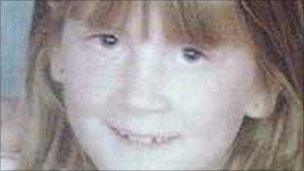Hyponatraemia inquiry: Anaesthetist says she was not asked to attend meeting
- Published

Nine-year-old Raychel Ferguson died in hospital in 2001
An anaesthetist has told the public inquiry into the death of a child in 2001 that she was not asked to attend a critical incident inquiry meeting held by senior management after the death.
A sworn statement was given to the police by the trust's medical director who said the anaesthetist had attended the meeting.
Raychel Ferguson died in the Royal Belfast Hospital for Sick Children.
Her death is one of five being investigated by the inquiry.
The hyponatraemia inquiry has heard conflicting evidence about who was in charge of her post-operative care and the type and amount of fluids she was given.
The court heard on Thursday that the clinician was also asked to add to the child's medical notes a day after the meeting.
The inquiry has so far heard evidence on the deaths of two children.
Raychel Ferguson, 9, from Londonderry, died in the Royal Belfast Hospital for Sick Children in 2001.
It followed surgery at Derry's Altnagelvin Hospital.
On Thursday, the inquiry's chairman John O'Hara QC ruled that the Western Health Trust's legal team could not represent all of the doctors and nurses that are involved in the case of Raychel Ferguson.
Contrast
Until now, one legal team had been representing the trust and its employees.
It has been documented that the doctors' and nurses' versions of what happened that day are in stark contrast.
Counsel for the inquiry questioned how one legal team could represent the contrasting views of all the doctors and nurses involved in Raychel Ferguson's case.
Mr O'Hara said it would be conflict of interest and said each nurse must now be offered separate legal representation.
"My concern is that there are apparently stark conflicts between the various individuals and groups involved which make it difficult for me to be reassured that all of their interests can be fully and fairly represented by a single legal team," he said.
The nurses are to be offered separate legal advice with their evidence to start on 18 February.
The inquiry has also been examining the death of Claire Roberts.
The nine-year-old died at the Royal Belfast Hospital for Sick Children (RBHSC) in 1996.
She had been admitted to hospital following vomiting and drowsiness. Doctors prescribed intravenous fluids.
Two days later, Claire suffered a respiratory arrest and never recovered.
On Thursday, the chairman was asked to make an early ruling surrounding an accusation made by child's father.
Earlier in the Inquiry, Mr Roberts alleged that his daughter's medical notes had been amended eight years after Claire's death.
The words encephalitis and encephalopathy are written to the side of the notes.
Mr and Mrs Roberts told the inquiry they did not recall these words being used by doctors when Claire was ill.
They allege the words were added by Dr Sands eight years later when the case was reopened.
Denial
The inquiry heard the words are in Dr Sands' handwriting. Mr Roberts said he believes Dr Sands was guided by Dr Steen.
Dr Heather Steen told the inquiry in December 2012 that she denied claims of a cover-up into Claire Robert's death.
Both doctors continue to work at the hospital.
Through their legal team they said to challenge their competence is one thing but to challenge their honesty is another.
Mr O'Hara was invited to make a finding on the allegation of fraud or dishonesty made by Mr Roberts.
Mr O'Hara said: "I accept they are particularly wounded by the allegation.
"But I cannot accept that it's appropriate to give rulings on specific factual disputes. "
Dr Andrew Sands was a registrar n the RBHSC and had attended to Claire.
Dr Sands is now a consultant paediatrician in the same hospital.
The chairman announced on Thursday evening that the inquiry has been adjourned. It is expected to resume on 18 February.
The inquiry is also due to investigate the death of Adam Strain, who was four when he died at the RBHSC in 1995.
The inquiry is also investigating the events following the deaths of Lucy Crawford, 17 month, who was initially treated at the Erne hospital in Enniskillen in 2000 and Conor Mitchell who was 15 when he died in the RBHSC in 2003.
In the case of four of the children, an inquest stated that hyponatraemia was a factor that contributed to their deaths.
Hyponatraemia describes an abnormally low level of sodium in the blood that can occurs when fluid is not administered correctly.
- Published1 February 2013
- Published17 December 2012
- Published31 October 2012
- Published15 October 2012
- Published25 September 2012
- Published24 September 2012
- Published24 September 2012
- Published16 April 2012
- Published27 March 2012
- Published26 March 2012
- Published26 March 2012
- Published29 February 2012
- Published20 February 2012